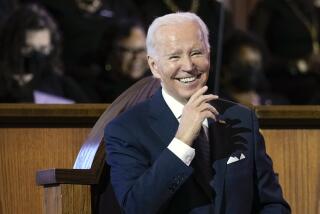Bush Salutes Bill of Rights--in Madison’s Back Yard : Constitution: The President appears to challenge those who argue that such human needs as shelter, food and clothing are guaranteed.
- Share via
ORANGE, Va. — President Bush Monday saluted the 200th anniversary of the Bill of Rights, while criticizing those who see the historic document as one that protects “specific social services or material standards of living.”
Speaking to an invited audience that included about three dozen justice officials, legislators and professors from former communist countries who are studying the U.S. Constitution as they prepare to write constitutions for their own nations, Bush also tied “the founders’ ideals of freedom of conscience” to his quiet campaign to restore prayer in public schools.
The setting for the President’s address was a tent in the back yard of Montpelier, the estate of James Madison, the fourth President of the United States and the author of the Bill of Rights.
By suggesting strict limits on the reach of the Bill of Rights, Bush plunged into a debate over whether economic issues that touch directly on an individual’s quality of life can be considered basic rights.
Thus, he appeared to challenge those who would argue that such human needs as shelter, food and clothing could be considered rights guaranteed by the Constitution and its first 10 amendments.
In a written statement distributed to reporters here, historian James MacGregor Burns, senior scholar at the Jepson School of Leadership Studies at the University of Richmond, said that the nation was “failing to live up to the glorious heritage of the original Bill of Rights and of the economic and social rights that millions of Americans have fought for in the last century and are fighting for today.”
Bush said, however, that “the framers had the humble genius to recognize that man-made laws and government are not a panacea for human problems. They believed law and government, like good medicine, should seek first and foremost to do no harm.”
The President continued:
“Taxation, public works, civil litigation, law enforcement activity are part of the framework of a just and civil society. They do give health to the social organization when provided in small, measured and necessary doses. But when taken needlessly or to excess, such medicine could sicken or kill a society.
“Today one often hears the concept of rights attached to specific social services or material standards of living,” Bush said. “The framers, however, did not elevate acquisition of even the most vital goods and services to the status of rights. . . . They understood that paternalism is just a sugar-coated tyranny.”
Bush, who frequently includes in his political speeches a reference to his opposition to the Supreme Court ruling that prohibited prayer in public schools, said that “respect for the founders’ ideals of freedom of conscience still drives us as we seek to restore the freedom of voluntary prayer in public schools.”
The President warned, as did Madison, of the dangers of “factions” that could assume too much power in American society--posing the risk, Bush said, of feuds “pitting women against men, race against race, every sort of fevered single-issue activist against the common good.”
More to Read
Get the L.A. Times Politics newsletter
Deeply reported insights into legislation, politics and policy from Sacramento, Washington and beyond. In your inbox twice per week.
You may occasionally receive promotional content from the Los Angeles Times.










